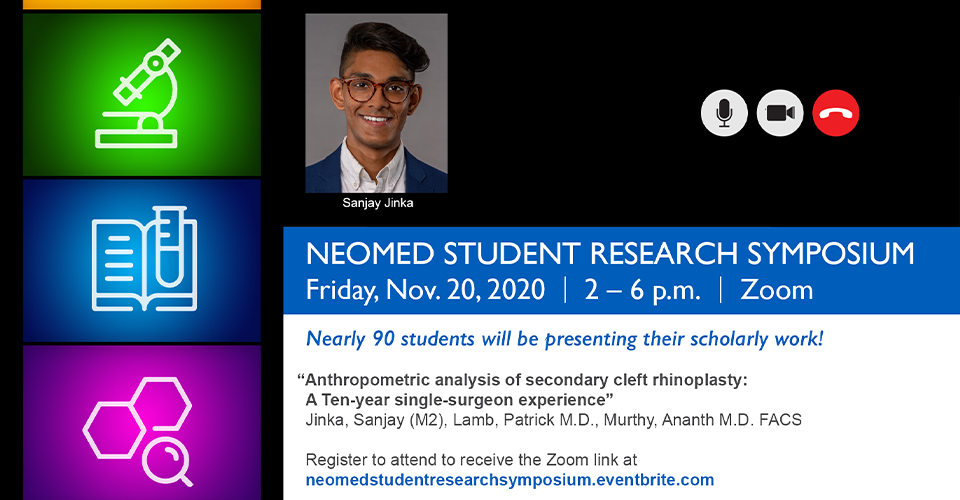Congratulations to the 88 NEOMED students whose work was showcased at the University’s online Student Research Symposium held via Zoom Friday, Nov. 20. The event was the first of its kind, co-presented by NEOMED’s Office of Research and Sponsored Programs and the Committee for Student Clinical Research.
Numbers only hint at the ambition and accomplishment that was on display.
Sanjay Jinka, a second-year College of Medicine student, presented three different research projects, each represented by a three-minute prerecorded video. Working with other students and faculty mentors, Jinka completed clinical research in plastic surgery; a quality improvement project related to fundraising at the Student-Run Free Clinic at NEOMED; and behavioral research related to the impact of COVID-19 on rural communities.
“In the era of COVID-19 many research conferences have been cancelled. Through the hard work put in by faculty, staff, and students like Gordon Hong [president of the Committee for Student Clinical Research and the student organizer for the event] the NEOMED symposium offered an opportunity to present research without in-person contact,” Jinka wrote afterward.
Sophie Bell, a second-year College of Medicine student, was also enthusiastic.
“It was an amazing experience to work with Becky Lehman [director of health education and promotion] at the Portage County Health District, Mindy Gusz [community outreach coordinator] from University Hospitals Portage Medical Center, and NEOMED mentors Dr. Amy Lee and Kim Trowbridge, to help finalize a resource guide [the Healthy Eating and Activity Living Guide] for community members, and then distribute this resource guide to primary care provider offices throughout the county,“ Bell wrote following the event.
Setting the tone
In a plenary address, NEOMED President John T. Langell, M.D., Ph.D., spoke of his own research and how important research mentors had been to him as a student in an eight-year combined M.D./Ph.D. program.
Then, three hours of presentations and conversations took off.
The abstracts were divided into five sessions: Mind and Brain; Clinical Investigations and Translational Models; Program Evaluation, Quality Improvement and Education Research; Evolutionary Biology, Foundational Orthopedics and Auditory Science; and Cardiovascular and Metabolic Disease. Every session contained three breakout rooms, allowing audience members to move easily from presentation to presentation.
Each breakout room session began with a series of three-minute videos made by the researchers. After that, student moderators – Alessandro Brunetti, Meghana Chalasani, Jessica Chang, Manasa Melachuri, Kevin Mo, Jay Natarajan, Negin Orfanian Azimzadeh Khosravi, Thomas Scott, Koshala Selvakumar and Katherine Wu – posed thoughtful questions and skillfully directed questions from audience members to the presenters.
Steven Schmidt, Ph.D., vice president of research, congratulated the students on the high quality of their work. “I was very impressed with the professionalism of the students and the caliber of their research,” Dr. Schmidt said afterward.
He also noted the important contribution of the conference organization committee, consisting of Fady Abdlrasul, Pharm. D.; Julie Aultman, Ph.D.; Brian Butler, M.B.A., Christine Dengler-Crish, Ph.D.; Alexander Galazyuk, Ph.D; Stacey Gardner-Buckshaw, Ph.D., M.P.A.; Rebecca Hayes, M.P.A., C.R.A.; Gordon Hong (student) Nona Hose; Vahagn Ohanyan, M.D., Ph.D., Steven Schmidt, Ph.D.; and Harmony Stanger, M.B.A.
